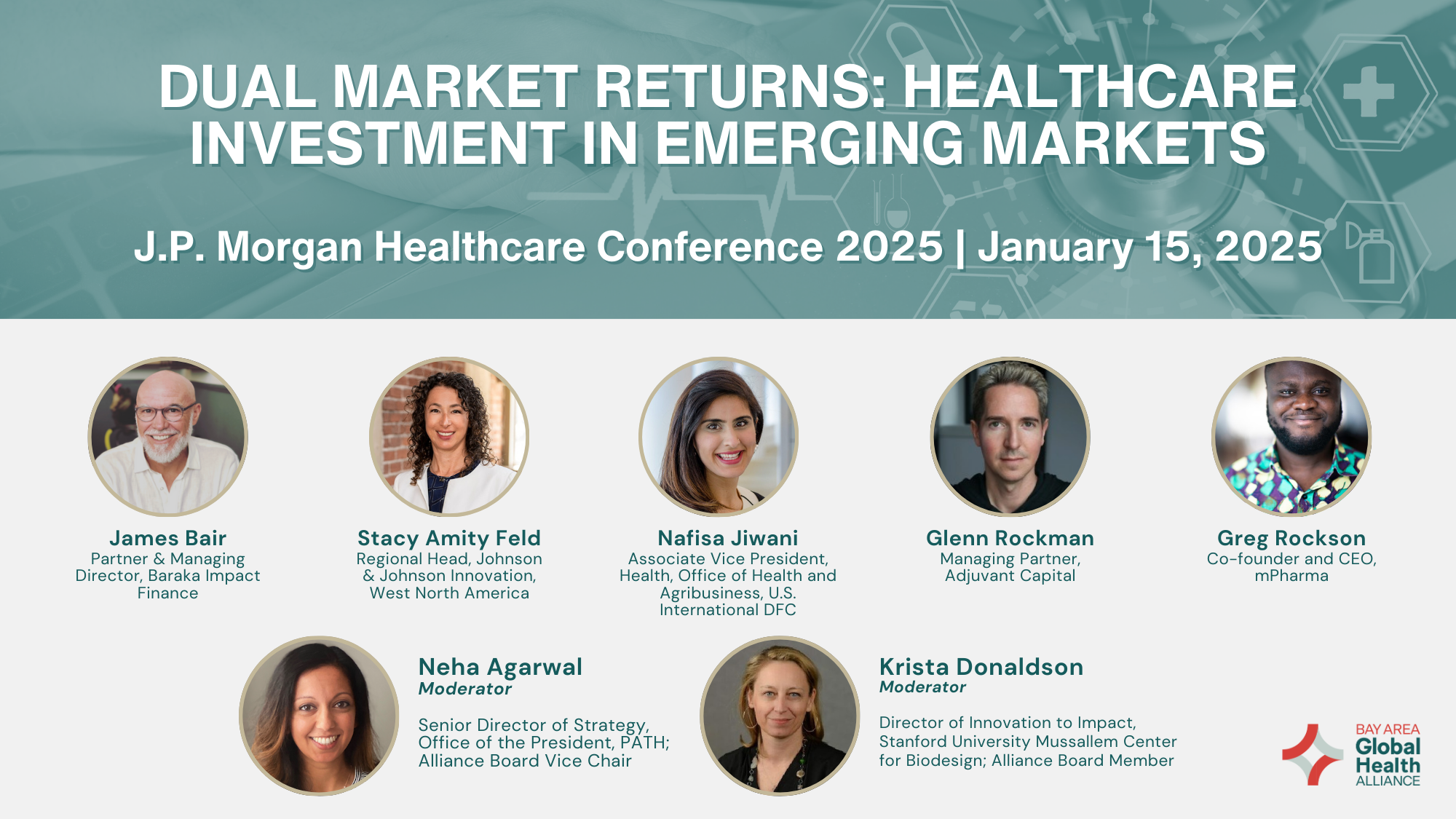Listen to the JPM panel here. | Watch the conversation held at Accenture here.
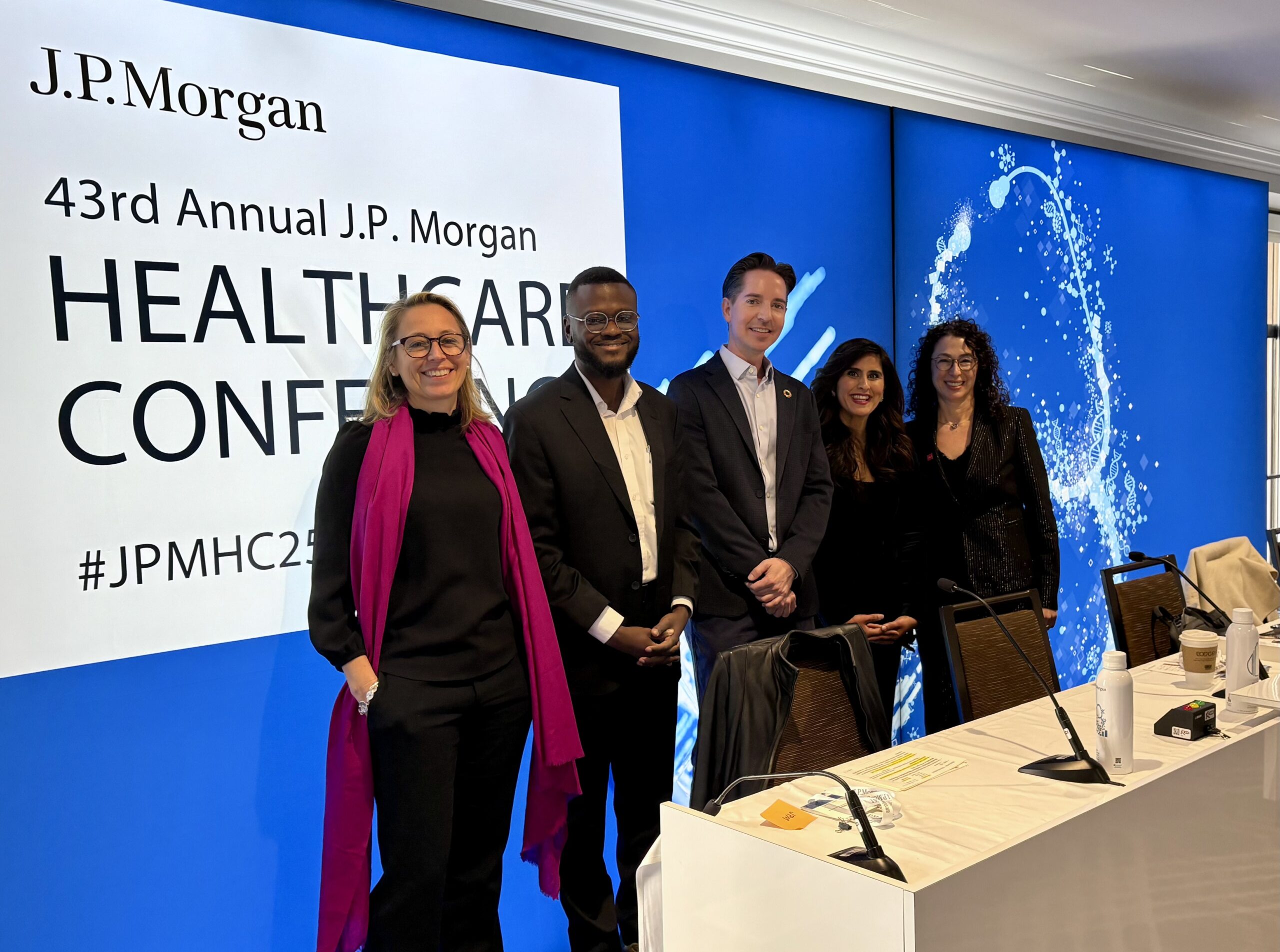
Panelists at the J.P. Morgan Healthcare Conference. Pictured left to right: Krista Donaldson, Gregory Rockson, Glenn Rockman, Nafisa Jiwani, and Stacy Feld.
On Wednesday, January 15, the Bay Area Global Health Alliance hosted a panel discussion, Realizing Returns: Investment Opportunities in Emerging Markets, at the 2025 J.P. Morgan Healthcare Conference (JPM) in San Francisco, followed by a reception to continue the conversation, Private Sector Finance for Global Health: Investing for Impact and Equity, held at Accenture San Francisco Innovation Hub.
Together, these discussions explored investment opportunities in global health and partnerships using innovative financing models to drive both business and social returns in emerging markets.
Speakers highlighted the untapped potential these markets represent for both financial and social impact returns, while also addressing the challenges of managing investment risks.
Key Takeaways:
- Demographic Growth Driving New Markets: Rapid population growth, expanding middle classes, and increasing demand for healthcare are key drivers of emerging markets. These demographic shifts create new, high-potential investment opportunities, particularly in healthcare.
- Emerging Markets as “Sleeper Markets”: Often overlooked due to perceived high risks, emerging markets represent untapped potential, especially in healthcare. These markets are experiencing rapid growth driven by expanding infrastructure, rising demand for advanced technologies, and innovations like mobile health and AI, making them prime areas for investment.
- Real vs. Perceived Risk in Emerging Markets: While concerns about risks in emerging markets are common, data-driven insights and successful case studies show that these risks are often more manageable than they appear. By shifting the focus from perceived instability to real-world successes, investors can better recognize the significant opportunities these markets offer.
- Mitigating Currency Depreciation Risk: Currency depreciation is a common concern for investors in emerging markets. However, diversifying investments across multiple countries helps manage this risk, providing a natural hedge against currency volatility in any single market.
- Innovative Financing Models for Risk Mitigation: Blended finance models that combine philanthropic funding with private sector capital help to de-risk investments, enabling scalability of healthcare solutions in emerging markets. These models allow for long-term sustainability and attract more investors to high-impact sectors like healthcare.
- Government Support Helps De-risk Investments: Government-backed institutions, like the DFC, play a crucial role in de-risking investments by offering favorable financing terms, creating bespoke models for private sector partners, and attracting additional investments, thus increasing project viability and sustainability.
- Challenges and Barriers in Emerging Markets: Emerging markets may experience political instability, underdeveloped infrastructure, complex regulations, and fragmented healthcare systems that can deter investment. Overcoming these challenges requires building strong local partnerships, utilizing innovative financing models, and gaining a deep understanding of the region’s specific dynamics. Tailored approaches that address these unique obstacles are key to unlocking opportunities and driving sustainable growth.
- Private Sector Capital is Essential for Scaling Healthcare: With traditional funding sources like foreign aid decreasing, private sector capital is critical for scaling healthcare solutions in emerging markets. Investment models that blend financial returns with social impact are crucial for meeting global health goals and ensuring sustainability.
“Healthcare investments in emerging markets have outperformed broader healthcare markets and are the fastest growing in the world.” – Krista Donaldson, Director of Innovation to Impact, Stanford Mussallem Center for Biodesign; Alliance Board Member, citing industry reports.
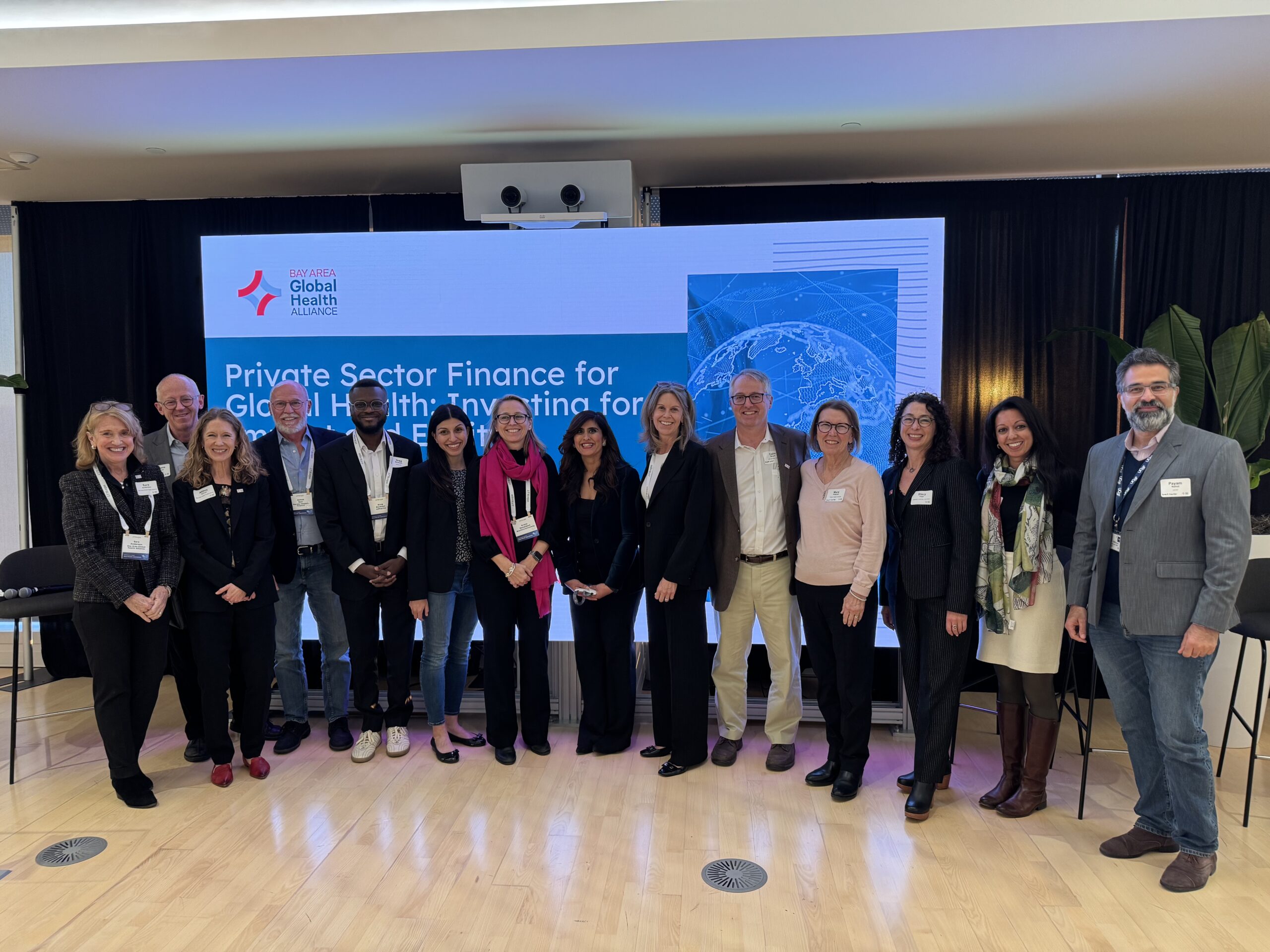
JPM panelists with Alliance board members and staff.
At JPM, moderator Krista Donaldson, director of innovation to impact at Stanford Mussallem Center for Biodesign and Alliance board member, highlighted that the growth of emerging markets is fueled by expanding healthcare systems, rising demand for advanced technologies, and innovations such as mobile health and AI-powered devices. She pointed to a growing middle class, rapid adoption of technology and mobile banking, and increased government spending as key catalysts of this growth.
Building on this [at Accenture], Neha Agarwal, senior director of strategy at PATH and Alliance board vice chair, underscored the critical role of private capital, impact investing, and innovative financing models in addressing the global health financing gap. “Philanthropic investments and more governmental sources of funding are predicted to be flat over the next couple of years to decades…we know that we’re really falling short in terms of meeting the financing that’s needed to obtain our Sustainable Development Goals, particularly for health and wellbeing,” she explained.
When asked about how Johnson & Johnson is thinking about investment opportunities, Stacy Feld, regional head of Johnson & Johnson Innovation, shared [at JPM] how they are making fund investments with a traditional 10-year outlook plus two years and partnering with the ecosystem to ensure that this becomes a long-term sustainable asset class that achieves profitability and ultimately benefits patients and healthcare workers. “We want to support accelerators and incubators that help reduce risk for innovators bringing products to market. These are the same fundamental principles that make any health ecosystem thrive,” Feld explained, highlighting their partnership with Villgro Africa, an incubator and impact investor, to support emerging healthcare entrepreneurs and businesses in Africa.
In Southeast Asia, where people are eight times more likely to visit their pharmacy as they are to visit their physician, 80% of pharmacies operate independently. Feld indicated one investment in a company called SwipeRX that is bringing capabilities, network and accessibility to connect these pharmacies, and is now scaling across all of Southeast Asia connecting over 300,000 pharmacists and ultimately providing better care to the communities they serve.
Feld also emphasized the need for tailored approaches and partnerships with multiple stakeholders to address systemic challenges and deliver lasting impact, noting how in addition to direct investments into the fund, they also have 17 portfolio companies and 4 fund investments that gives them access to multiple geographies. “It’s a comprehensive approach to directing capital in a way that helps build sustainable partnerships. There’s no one-size-fits-all solution for creating opportunities in emerging markets,” Feld said, sharing how they take the opportunity to build relationships at various layers.
Nafisa Jiwani, associate vice president for health at the U.S. International Development Finance Corporation (DFC), spoke about how the DFC drives private investment in emerging markets. She shared how the DFC’s health portfolio has grown from $200 million in 2020 to $3.4 billion today, with priorities in healthcare delivery and infrastructure, supply chains, and health-tech innovation.
She emphasized the unique advantages DFC offers, including longer loan tenors, competitive interest rates, and bespoke financing structures tailored to the needs of private-sector partners. She pointed to success stories like Kasha, a health-tech platform in Africa, which turned a $1 million equity investment into $50 million in revenue, illustrating the potential for both profitability and social impact. “A lot of the reason why our partners come to us is because we’re going to be creating a bespoke model for a structure that makes sense for that private sector partner,” she shared [at JPM]. She also highlighted the DFC’s ability to help de-risk investments through debt, equity, and political risk insurance and attract additional investments, “When you have the U.S. government backing your project, it also crowds in other financing.”
Glenn Rockman, managing partner at Adjuvant Capital, a traditional life sciences venture capital fund that focuses on addressing neglected diseases and maternal and child health challenges, shared how Adjuvant strategically invests in late-stage innovations that have been significantly de-risked by organizations like the Gates Foundation, NIH, or the Wellcome Trust. “We put low-risk capital into a late-stage drug or vaccine, support its regulatory approval, and secure procurement contracts with organizations like UNICEF,” he said [at Accenture].
Gregory Rockson, co-founder and CEO of mPharma, brought a unique perspective as an entrepreneur building healthcare infrastructure in Africa. Rockson described how mPharma is transforming community pharmacies into primary care hubs across nine African countries, enabling pharmacists to manage care and reduce reliance on overburdened hospital systems. “Community pharmacies are one of the most underutilized assets in healthcare,” he said [at JPM]. “By empowering them with the tools and diagnostics needed for managed care, we enable these local communities to have a low-cost healthcare provider that they already trust and utilize.” In discussing their model, Rockson shared [at Accenture], “Right from day one, we’ve had to have a very commercial mindset around how we achieve our impact objective while building a business that can underwrite itself in the long term.”
Rockson also emphasized the importance of understanding the diverse needs of patients beyond just a single disease. “A person doesn’t see themselves as a malaria patient — they may have multiple health needs,” he explained [at Accenture], recognizing that patients often require more than one solution. He also highlighted the value of partnerships and collaboration to drive systemic change and achieve health equity, stating, “No one organization can do everything on its own.”
“We shifted from focusing on single-country investments to building a diversified portfolio across multiple countries. By ensuring that no single country accounts for more than 15% of our revenue, we’ve created an internal hedge. This approach allows us to manage currency risks effectively, even if one country experiences severe depreciation.” – Gregory Rockson, Co-founder and CEO of mPharma
At JPM, Glenn Rockman described emerging markets as “sleeper markets” with significant investment opportunities. Rockman emphasized that “The hardest part is convincing people that you can generate strong financial returns in emerging markets.” Providing an example, Rockman highlighted how malaria rapid diagnostic tests cost pennies to produce, reach millions annually and are backed by major funders like the Gates Foundation, but shared how many investors overlook these opportunities because of perceived risks.
In discussing risks, Gregory Rockson described the challenges of managing currency risk. “When you’re investing in emerging markets, the single biggest red flag for investors is currency risk,” he said [at Accenture]. Sharing his experience based on the severe currency depreciations they’ve seen in markets like Ghana and Nigeria, mPharma adopted a strategy of diversifying across multiple markets with different currencies. “We shifted from focusing on single-country investments to building a diversified portfolio across multiple countries. By ensuring that no single country accounts for more than 15% of our revenue, we’ve created an internal hedge. This approach allows us to manage currency risks effectively, even if one country experiences severe depreciation,” he shared [at JPM].
“I believe in numbers, and I think that the way we get investors more comfortable and demystify that risk is just to create more success stories…if we can achieve that and you can generate real returns for investors, then people tend to talk less about the perceived aspects of risk because they’ve actually achieved real returns.” – Gregory Rockson, Co-founder and CEO of mPharma
When asked [at Accenture] about the chasm between actual vs perceived risks, Rockson shared, “I believe in numbers, and I think that the way we get investors more comfortable and demystify that risk is just to create more success stories…if we can achieve that and you can generate real returns for investors, then people tend to talk less about the perceived aspects of risk because they’ve actually achieved real returns.”
Donaldson, citing a report from the Symbiotics group, added, “Overcoming perceived risk vs real risk is data-driven decision support. [Symbiotics] looked at a number of economic factors, and it showed that sometimes perception is driven by emotion and perception; and we know the perception of emerging markets in the media is not the reality.”
James Bair, partner and managing director at Baraka Impact Finance, also discussed the growing role of private sector investment in global health [at Accenture]. With traditional foreign aid facing increasing pressure, Bair emphasized, “Foreign aid alone can’t sustain global health efforts; we need the private sector to step up,” he said, highlighting the importance of blended finance models that combine philanthropic support with return-seeking investments.
“We want to champion intersectional approaches [to financing], bringing different stakeholders together with a shared interest in health improvements.” – James Bair, Partner and Managing Director of Baraka Impact Finance
Bair, whose firm focuses on impact-driven finance and developed the Baraka Analytics tool, outlined how these models can be applied to enhance health systems in low- and middle-income countries. “Blended finance allows us to scale solutions in a way that ensures long-term sustainability,” he explained. He also pointed to the growing interest among investors in both social impact and financial returns, noting that “investors are increasingly looking for projects that align with both measurable outcomes and strong financial performance.”
Bair also shared a few key insights from the December 2024 Rockefeller Foundation Bellagio convening co-hosted by the Alliance and Baraka: Addressing risk perceptions, fostering long-term systemic change, and the need for a diverse capital stack that blends philanthropic capital with investors seeking market returns. Emphasizing the priority of health equity and noting the group’s focus on advancing these goals, “We want to champion intersectional approaches [to financing], bringing different stakeholders together with a shared interest in health improvements,” he said [at Accenture].
To learn more, here are some articles we are reading. Our thanks to Baraka Impact Finance for this list:
- Sizing the Impact Investing Market 2024 (GIIN, 2024)
- Global Healthcare Private Equity Report 2024 (Bain, 2024)
- Investors for Health: Private Capital’s role in Healthcare Delivery in Emerging Markets Beyond COVID (Investors 4 Health, 2022)
- Sophisticated financing and smarter partnerships: How investors are forging new roadmaps for health impact (Baraka Impact Finance, 2024)
- Navigating Emerging Markets HealthcareTrends (Morgan Stanley, Oct 2023)
- Government Health Spending Outlook – Projections Through 2029 – Diverging Fiscal Pressures, Uneven Constraints (World Bank, 2024)
- Government Health Spending Trends Through 2023: Peaks, Declines, and Mounting Risks (World Bank, 2024)
- Misperception of Risk in Emerging Markets (Symbiotics, 2024)
- The Role of Private Healthcare Sector Actors in Health Service Delivery and Financing Policy Processes in Low- and Middle-Income Countries (BMJ, 2024)
- Governance of the Private Healthcare Sector in Low- And Middle-Income Countries: A Scoping Review of Approaches, Effectiveness, and Enablers (WHO, 2024)
- Public Versus Private Health Financing Transition in Low- and Middle-Income Countries: Exploring the Crowding-Out Effects | The European Journal of Development Research (European Journal of Development Research, 2024)
- Innovative Startups Are Changing the Landscape of Health Impact Everywhere. Are Investors Aware? (Impact Alpha, 2024)
- What Steps Can Improve and Promote Investment in the Health and Care Workforce?: Enhancing Efficiency of Spending and Rethinking Domestic and International Financing (WHO, 2023)
- Investing in Health: Time for a Rethink (World Bank, 2024)
- SAMRIDH Healthcare Blended Financing Facility (USAID, SAMRIDH, 2024)
PANELISTS
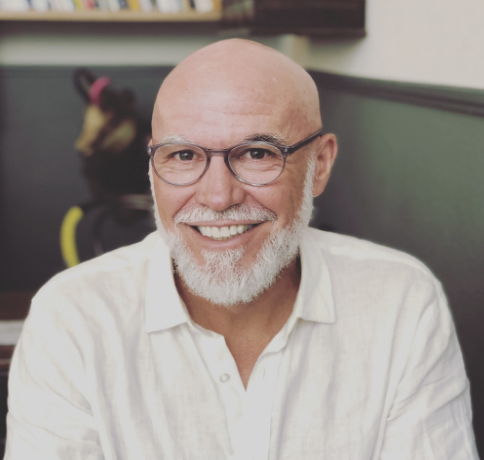 James Bair, Partner and Managing Director, Baraka Impact Finance
James Bair, Partner and Managing Director, Baraka Impact Finance
At Baraka Impact Finance, Bair’s focus is on steering investments toward sustainable health solutions in emerging markets. Their team leverages private capital for impactful change at the intersection of finance, health, and technology. They’ve fostered a robust network that ensures the success of health sector advancements in some of the most challenging environments. His tenure as director of Stanford University’s Department of International Medical Services and as the director of the NIH-designated Center of Excellence in Women’s Health at UC San Francisco enriched his understanding of the innate challenges in delivering affordable and appropriate primary, secondary, and tertiary care services across diverse markets and communities. His work with the UN Office of the High Commissioner for Human Rights on SRH services in Uganda grounded him in the realities of establishing sound clinical practices for protecting human health rights in societies that lack consensus on such rights. With their launch of Baraka Analytics in Q2 2024, Baraka has advanced a tool and a methodology to scale the vetting and visibility of health innovations designed for underserved communities. With Baraka Analytics, they combine rigorous health access, affordability, quality, and equity analyses with market contextualizing data that expedites funder and investor review and, ultimately, accelerates capital deployment. He is honored to lead this innovative global team of public health, SME finance, and legal and data analytics experts to drive measurable, monitorable, and sustainable impact on human health and well-being.
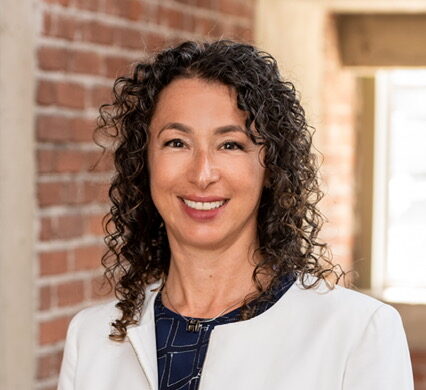 Stacy Amity Feld, Regional Head, Johnson & Johnson Innovation, West North America
Stacy Amity Feld, Regional Head, Johnson & Johnson Innovation, West North America
Stacy Feld has more than 27 years of diverse business experience and is a recognized healthcare leader in the San Francisco Bay Area life science and technology innovation ecosystem. With leadership experience in business development, intellectual property licensing and venture capital investing, Feld has focused her career on translating transformative assets and technologies into impactful health solutions for patients and consumers. In her current role as regional head of Johnson & Johnson Innovation, West North America, Stacy leads a high-performing team of scientific and business leaders to build, advance, and manage a portfolio of co-investments and collaborations spanning the pharmaceutical and medical device sectors. Feld is also responsible for expanding and nurturing the external networks within the innovation community, including academia, venture capital, entrepreneurs, and other governmental and private organizations. She is also the executive sponsor of Johnson & Johnson Innovation’s strategic approach to integrating health equity into the innovation process and supporting entrepreneurial and investment communities in addressing disparities in healthcare. Feld earned her B.A. in Sociology from the University of Pennsylvania and her J.D. from Vanderbilt Law School.
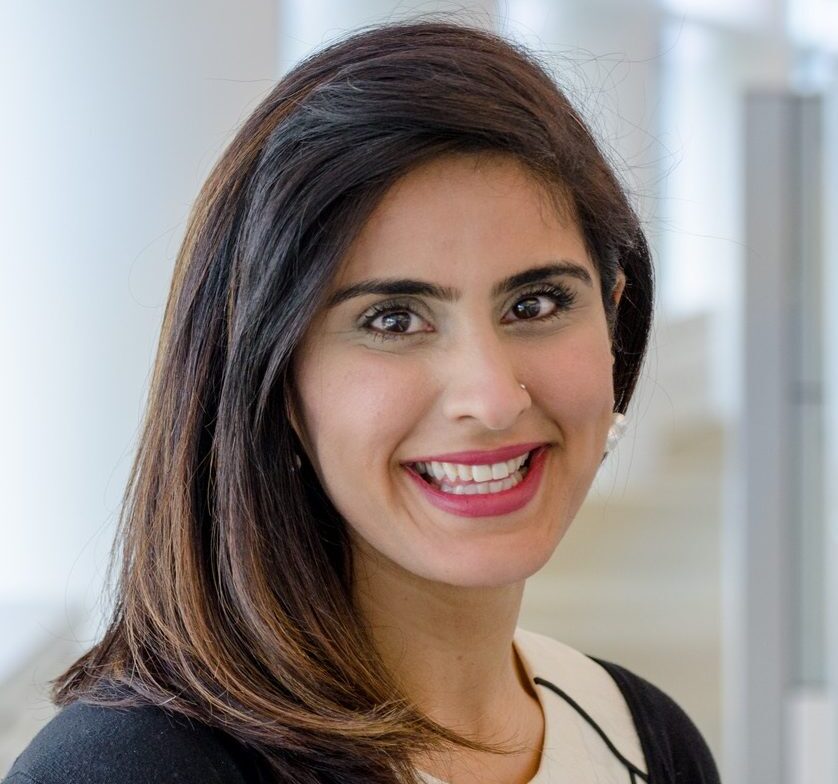 Nafisa Jiwani, Associate Vice President, Health, Office of Health and Agribusiness, U.S. International Development Finance Corporation (DFC)
Nafisa Jiwani, Associate Vice President, Health, Office of Health and Agribusiness, U.S. International Development Finance Corporation (DFC)
Nafisa Jiwani is the associate vice president, health, Office of Health and Agribusiness at the U.S. International Development Finance Corporation (DFC), America’s development bank. As head of global health, Jiwani serves as a senior adviser to the agency’s chief executive officer, providing guidance and leadership on policy and transactional matters focused on global health. Jiwani is spearheading DFC’s Health and Prosperity Initiative, which seeks to mobilize capital to strengthen health systems and improve resiliency in developing countries. Before joining the agency, Jiwani served as the deputy senior advisor to the Secretary of Health and Human Services on Value-Based Care, where she led strategic department-wide priorities on maternal morbidity and mortality, sepsis and kidney care, social determinants of health, and artificial intelligence/predictive analytics. Before taking her role at HHS, Jiwani worked at the Centers for Disease Control and Prevention (CDC) as a team lead for policy and partnerships in the office of the associate director for policy and strategy. At CDC, she focused her efforts on health systems transformation and was responsible for translating evidence into payment policy. Jiwani’s previous experience includes work in international development, clinical psychiatry research, youth development, and newborn screening translational research. Jiwani earned a BA in psychology from Southern Methodist University and an MPH in Management and Policy from the Rollins School of Public Health, Emory University.
 Glenn Rockman, Managing Partner, Adjuvant Capital
Glenn Rockman, Managing Partner, Adjuvant Capital
Glenn Rockman has more than 20 years of experience in venture capital and investment banking. He is a managing partner at Adjuvant Capital, which oversees $300 million of AUM in a fund announced in 2021. Before Adjuvant, Rockman was a managing partner at the investment advisory firm responsible for managing the Global Health Investment Fund (GHIF). Prior to GHIF, Rockman was an executive director in J.P. Morgan’s Social Finance unit. He served in similar capacities at J.P. Morgan for more than a decade before leaving to focus exclusively on life sciences investing after being seconded to the Gates Foundation as part of the GHIF launch. Rockman is a board member at the RIGHT Foundation in South Korea, which focuses on innovations for deeply neglected diseases. He is also vice chair of WaterEquity, a firm dedicated to water and sanitation investments in emerging markets. Glenn earned an AB in Public Policy from Princeton University.
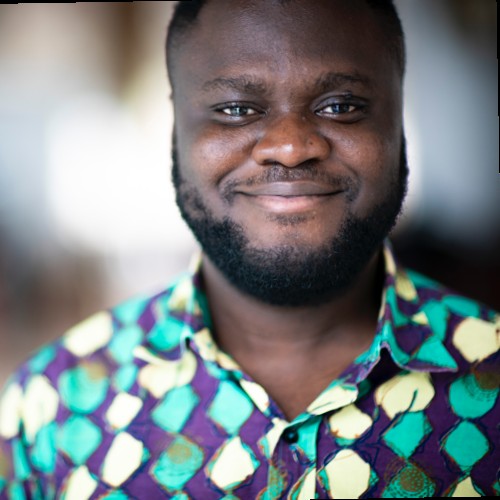 Gregory Rockson, Co-founder and CEO, mPharma
Gregory Rockson, Co-founder and CEO, mPharma
Greg Rockson is the co-founder and CEO of mPharma, a technology-driven, vendor-managed inventory and retail pharmacy operator serving two million patients annually with essential primary healthcare through a network of pharmacies across ten African countries. Since launching mPharma in 2014, Rockson has overseen its growth and expansion and has led the acquisition and integration of leading pharmacy chains in Kenya, Nigeria, and Uganda, strengthening mPharma’s position as a market leader in pharmacy innovation. With over 10 years of experience in the health tech sector, Rockson is passionate about using technology to transform community pharmacies into primary healthcare providers in Africa while improving access, affordability and the quality of medicines and health services for millions of people across the continent. An alumni of the World Economic Forum Global Shapers Community and tech pioneer, he was a PPIA Fellow in Princeton University’s Woodrow Wilson School and a Rotary Scholar at the University of Copenhagen.
MODERATORS
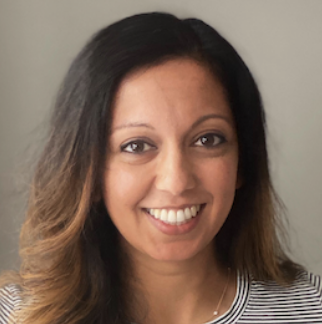 Neha Agarwal, Senior Director of Strategy, Office of the President, PATH; Alliance Board Vice Chair
Neha Agarwal, Senior Director of Strategy, Office of the President, PATH; Alliance Board Vice Chair
Neha Agarwal is a passionate advocate for global health equity and approaches her work with a strong vision for sustainability, respectful collaborations, innovation, and analytical rigor. She has over 15 years of experience in global health and the life sciences. Agarwal is currently the senior director of strategy, Office of the President, PATH, and formerly global diagnostics program co-director for PATH, where she led a team responsible for improving and ensuring equitable access to essential diagnostic products in resource-limited settings. She held previous global health roles at the Clinton Health Access Initiative (CHAI) and Applied Strategies. Agarwal has focused on bridging partnerships between industry, governments, and the non-profit sector in her various roles. Prior to her transition to global health, Agarwal’s career focused on innovative product development at companies such as Johnson & Johnson and Verinata Health (now Illumina), earning her several patents for lab-on-chip and drug delivery technologies. Agarwal is passionate about utilizing the talent, scientific rigor, and innovative energy of the Bay Area to achieve health equity around the globe. She has several publications, holds four patents, and received her MS in Biomedical Engineering from Columbia University and her BS in Bioengineering from the University of California, Berkeley.
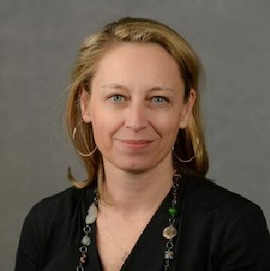 Krista Donaldson, Director of Innovation to Impact, Stanford University Mussallem Center for Biodesign; Alliance Board Member
Krista Donaldson, Director of Innovation to Impact, Stanford University Mussallem Center for Biodesign; Alliance Board Member
Krista Donaldson is an engineer, designer, author, and entrepreneur recognized as a World Economic Forum Technology Pioneer, TED speaker, and one of Fast Company’s “50 Designers Shaping the Future.” Donaldson is the director of Innovation to Impact at Stanford University’s Mussallem Center for Biodesign, where her work focuses on ensuring design tools and processes are broadly applicable across global markets. She is also part of the team establishing the East Africa Biodesign Program at universities in Kenya and Rwanda. In addition to her work at Stanford, she serves on several boards, including the Bay Area Global Health Alliance, and works with organizations to promote financing of local medtech innovation in emerging markets. Before joining Stanford, Donaldson was the founder and CEO of Equalize Health, where she led the development of disruptive medical devices focused on emerging markets. Equalize Health’s products are sold in 80 countries and have treated over 2M+ patients — primarily children and young people. Donaldson also served as an economic officer at the U.S. Department of State, where she managed part of Iraq’s reconstruction portfolio, co-founded the startup Safehub (acquired by Bitium, USA), designed water pumps at KickStart International (Kenya), and worked on a range of projects at the design firm IDEO (USA).

